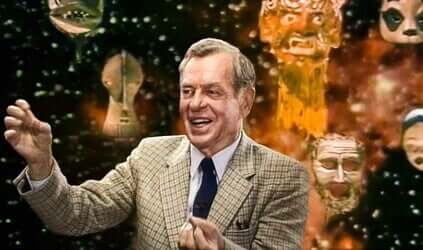Discover the biography of Joseph Campbell, an American thinker, writer, anthropologist, and professor known for his studies of the world of mythology.
His work was considered of great importance in his field, but also in other fields, such as psychiatry.
- He was a contemporary of other great thinkers and influential figures of the twentieth century.
- Such as Jiddu Krishnamurti and James Joyce.
- So he was influenced by various philosophical and thoughtful currents.
Campbell has dedicated his life and work to comparative mythology. His most relevant work is “The Hero of a Thousand Faces”, although he has written many books that, even today, are considered a mandatory reading for anthropologists and therapists.
In fact, his work has inspired many professionals in various fields, from psychology to the world of film. Then we will take a tour of the exciting journey of this great hero who has managed to transcend generations.
Born in New York city in 1904. Young Campbell went with his father to the American Museum of Natural History, where he became interested in everything related to american Indian culture.
A few years later, he became an expert in this field and, mainly, in the mythology of this culture.
Joseph Campbell graduated in English literature from Columbia University in 1925, where he also earned a master’s degree in medieval literature in 1927, while at this university he made two important trips to Mexico and Guatemala.
Later, he traveled to Europe and met the philosopher and writer Jiddu Krishnamurti. After this meeting, he went to India and became interested in Eastern philosophies, especially Buddhism.
In Europe he continued his studies and specialized in the artric cycle, a set of literary texts derived from certain historical facts, as well as elements of Celtic folklore.
He studied Indo-European philology at the University of Munich and received a scholarship to study ancient French, Provencal and Sanskrit; In addition, during his years outside the United States, he learned French, German and Japanese, languages in which he remained fluent throughout the process. his life.
His first book, The Hero of a Thousand Faces, was released in 1949, is a book detailing what he called the hero’s journey and in which the concept of the hero’s monomito or journey first appeared.
He explains that every hero’s life is about embarking on a journey, forcing him to face a series of psychological trials that he must overcome in order to evolve as a human being.
In addition, the wisdom acquired must be shared with the rest of the world when returning home.
A curious and surprising fact is that Joseph Campbell has shown that this myth is repeated in all cultures and mythologies of the world, regardless of religion or geographical influence.
In fact, it has shown that there is a way to make the necessary changes in human beings, and that this path is also universal.
Campbell worked with Swami Nikhilananda on the translation of the Upanishads, a set of Hindu holy books, and their later edition. He was also interested in the work of Swiss psychiatrist Carl Jung.
Among his best-known works are “The Masks of God”, “The Image of Myth” and “The Journey of the Hero”. Campbell’s literary heritage around mythology, spirituality and religion is enormous.
Filming began in 1985 on The Power of Myth, starring George Lucas, a scholarly director and disciple of Joseph Campbell’s work, and it was through his readings that the success of the famous Star Wars saga emerged.
Campbell was deeply influenced by works such as The Upanishads and authors such as Otto Rank, James Frazer, Abraham Maslow and Stanislav Grof; in addition, he was also influenced by the Jungian method of interpretation of dreams, closely related to the theory of myth he developed.
In his works you can see frequent references to writers such as James Joyce and Thomas Mann, as well as being attracted to the work of Pablo Picasso, Nietzsche and Schopenhauer.
Joseph Campbell died on October 30, 1987 in Honolulu and left a huge and valuable legacy in the field of comparative mythology.
He has combined a huge knowledge of history, literature, anthropology and religion that still have a particular interest in today’s academic world. Campbell was a hero to remember.

